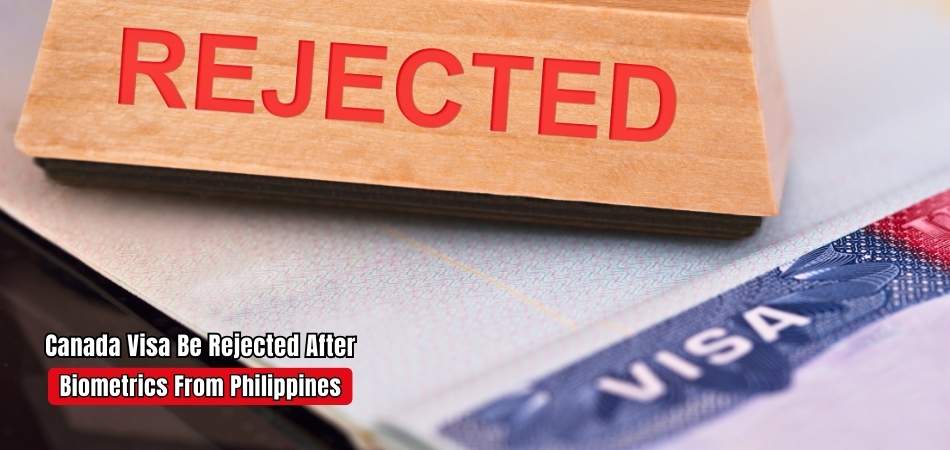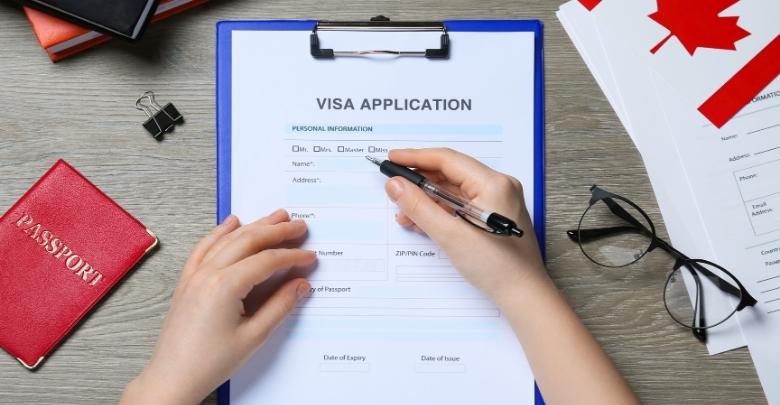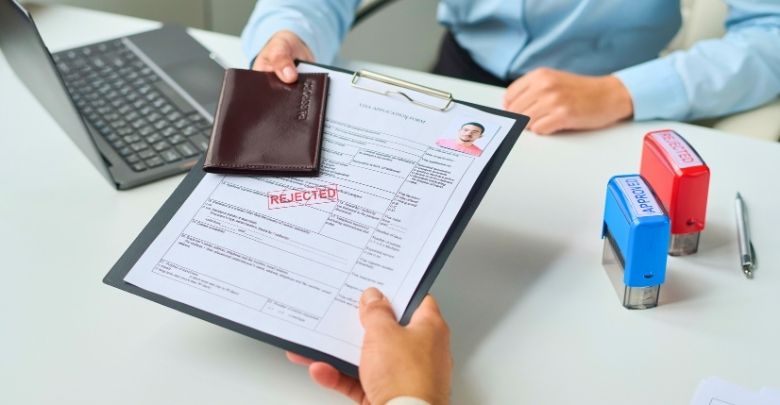Obtaining a Canadian visa is a significant step for anyone wishing to travel to Canada to visit family or pursue opportunities. Many applicants, particularly those from the Philippines, may be concerned about their chances of being accepted after submitting their biometrics, which leads to the question: Can a Canada visa be rejected after biometrics from Philippines?
Yes, a Canada visa can still be rejected even after completing biometrics from the Philippines. Biometrics is just one part of the application process. Factors like incomplete documentation, financial issues, medical concerns, or criminal history could lead to rejection. Biometrics doesn’t guarantee visa approval.
Curious to learn more about why a Canada visa might be denied after biometrics? This article covers every detail you need to know. Keep reading to understand common reasons for rejection and how to avoid them to improve your chances of success.
The Importance of Biometrics for Canadian Visa
Biometrics are becoming important for security worldwide, including for Canadian immigration. Canada values a secure and efficient system, so biometric checks are crucial. They help verify identities accurately, improving the safety of all travelers. In turn, this strengthens Canada’s security, preventing fraudulent applications effectively.
Canadian visa policies focus on maintaining strong identity verification. Biometrics play a key role in this, ensuring reliable tracking of applicants. Applicants go through background checks and identity proofing. These steps build trust in Canadian security protocols and support the country’s commitment to secure, controlled borders for visitors and residents alike.
For applicants, verifying identity through the biometrics process for Canada visa improves efficiency and security. This process prevents delays and makes the visa application easier to handle. With accurate information in the system, travelers experience less hassle. Using biometrics makes Canada’s visa system more streamlined and reliable.
Can a Canada Visa Be Rejected After Biometrics From Philippines?
Applying for a Canada visa can feel like a huge step toward an exciting opportunity, yet uncertainty about approval can still arise. Even after completing biometrics, certain factors might impact the application. Here’s a detailed look at why.
Incomplete or Incorrect Documentation
Providing all necessary documents with accurate information is crucial for Canada visa applications. Missing or incorrect details, like misspelled names or incorrect dates, can create doubt for officials. Even after biometrics, immigration officers may reject an application if documents appear suspicious. Double-checking every form and document helps prevent mistakes that could lead to delays or denial.
Financial Stability Requirements
Canada seeks to ensure that applicants can financially support themselves during their stay. Applicants must demonstrate sufficient funds to cover all expenses, from living costs to travel. Giving immigration officials insufficient evidence of financial stability may cause them to become suspicious. Providing clear and adequate financial statements will strengthen your application’s chance of success.
Medical and Health Concerns
A person’s health plays a role in Canada’s visa approval process, as the country prioritizes public health and safety. If an applicant has a medical condition that could strain Canada’s healthcare system, the visa could face rejection. An applicant should prepare thorough medical records, especially for any chronic conditions, to avoid health-related rejection.
Criminal Record or Security Concerns
Canada’s immigration system closely examines applicants’ backgrounds to maintain a safe environment for its residents. Applicants with criminal records or past security-related issues may face denial, even after biometrics. Being upfront about previous legal issues is essential, as background checks are thorough. Addressing this concern early can prevent unnecessary complications.
Past Visa Violations or Deportations
Previous visa violations, overstays, or deportations from Canada or other countries can affect a new application. Authorities will review an applicant’s travel history to assess the risk of non-compliance. Highlighting responsible travel behavior and explaining past issues can ease concerns for officials. Adhering to visa rules boosts credibility for current applications.
Misrepresentation or Fraud in Application
Accurate representation is fundamental in Canada’s immigration process, and even a small lie or exaggerated information can be detrimental. Canadian immigration officials are trained to detect discrepancies. Misrepresentation, even if by mistake, can lead to immediate rejection. Complete honesty, with thorough and clear explanations where needed, helps avoid issues of credibility.
Insufficient Purpose or Lack of Ties to Home Country
After a visit, immigration officials want confirmation that applicants plan to return home. A strong purpose, such as a job or family, shows commitment. Lacking proof of ties or having unclear travel plans can result in denial. Showing solid personal or professional commitments helps convey a genuine intention to return home.
Application Ties to Political or High-Risk Regions
If an applicant has ties to politically unstable or high-risk areas, the immigration process may face added scrutiny. Applicants from regions of recent unrest or heightened political issues may find more questions asked about their background and purpose. A detailed and organized application can help clarify intentions and dispel concerns.
Canada’s visa process involves a thorough review even after biometrics submission. Each requirement ensures only eligible and suitable applicants receive entry, keeping both the applicant and Canada in mind.
How to Avoid Common Mistakes in Your Canada Visa Application?
Applying for a Canada visa can be exciting, but errors in the application could lead to unexpected delays or even denials. Knowing common mistakes and how to avoid them will make the process smoother and more successful. Now let’s take a closer look at these steps below.
Double-Check All Documentation Thoroughly
One of the most common mistakes is submitting incomplete or incorrect documents. Carefully reviewing every document, from forms to supporting paperwork, helps catch errors early. Small mistakes in spelling, dates, or even the arrangement of documents could slow the process or lead to denial. Accuracy in this step shows attentiveness and commitment to a smooth application.
Ensure Sufficient Financial Proof
A strong financial profile is essential for visa applications, as it reassures officials that you can sustain yourself in Canada. Providing complete bank statements, income details, and other financial proofs demonstrates stability. Missing or vague financial documentation could raise red flags, impacting the success of your application. Make sure everything is clear, current, and fully verifiable.
Be Mindful of Medical and Health Documentation
Canada requires applicants to meet certain health standards, and incomplete health records can delay your application. Any known medical conditions should be documented transparently, with supporting evidence from credible healthcare providers. Presenting accurate medical information builds trust with visa officials and prevents setbacks in processing times or potential denials based on health concerns.
Accurately Complete the Biometrics Process
Completing biometrics correctly is important, as any error could lead to significant delays. Sometimes, even applicants experience Canada visa processing delays after biometrics, due to inconsistencies or missed steps. Ensuring you’ve followed instructions precisely for biometrics, including appointment scheduling and data accuracy, minimizes the chance of delays at this stage of the application.
Show Strong Ties to Your Home Country
Applicants should demonstrate a clear intent to return home after their visit by showing family, job commitments, or property ownership. Providing proof of strong ties reassures officials that your visit is temporary. Overlooking this key requirement could lead to rejection or prolonged application processing, making it essential to present your case thoroughly and convincingly.
Knowing common mistakes in the Canada visa application process can prevent unnecessary delays and increase your chances of success. By following these careful steps, you can confidently approach each part of your application for a smoother experience.
What to Do if Your Canadian Visa is Rejected After Biometrics From the Philippines?
Getting a Canadian visa rejection after biometrics can feel like a major setback. But by knowing the reasons behind the rejection and making targeted improvements, you can reapply with greater confidence. Here are key steps to take after a rejection.
Step 1: Review the Rejection Letter Carefully
Examine the rejection letter thoroughly to identify the reasons your application was denied. Immigration officers provide detailed explanations on missing documents, insufficient information, or any issues that affected the decision. Knowing the exact reasons will allow you to correct these specific issues, giving you a better chance in the reapplication process.
Step 2: Improve Documentation and Correct Errors
Look over your documents and fix any errors or inconsistencies that might have led to the rejection. Make sure each document, from your forms to supporting papers, is clear, complete, and accurate. Double-checking information, such as dates and names, ensures there are no minor mistakes that could negatively impact your application next time.
Step 3: Strengthen Your Financial Proof and Stability
Financial evidence is critical in showing that you can support yourself during your stay in Canada. If financial documentation was an issue, provide updated, detailed bank statements and income verification. Including additional financial information can reassure officials of your financial stability and improve your application’s strength in this area.
Step 4: Consider Professional Immigration Assistance
An immigration expert can offer valuable guidance relevant to your case and specific needs. They can assist in clarifying complex requirements, help you prepare accurate documents, and provide strategies for a stronger application. Professional advice may be especially helpful if your case involves complex issues or you’ve faced multiple rejections.
Step 5: Reapply with Enhanced Application Quality
After addressing all issues from the rejection letter, reapply with a thoroughly reviewed application. Ensure all documents are correct and meet the visa requirements. Approach this attempt with a more complete and well-prepared application, which can improve the likelihood of a successful outcome and avoid future complications.
A visa rejection doesn’t mean your plans are over; it’s simply a call to strengthen your application. By making targeted improvements based on feedback, you can submit a more compelling application, boosting your chances of achieving your Canadian travel goals.
Expert Tips for Strengthening Your Canada Visa Application
You can improve your chances of getting a Canada visa and cut down on processing time by strengthening your application. By following expert tips, you’ll build a compelling, well-rounded application that stands out to immigration officers. Here are the key points to keep in mind.
- Research Eligibility Requirements: Fully aware of all eligibility requirements specific to your visa type helps you avoid unnecessary mistakes and build a complete, compliant application.
- Plan a Clear Itinerary: Creating a detailed itinerary of your trip, including dates, locations, and activities, shows your organized approach and a clear purpose for your visit.
- Highlight Relevant Skills and Experience: Showcasing your skills, especially if they relate to your reason for visiting Canada, can strengthen your application and add weight to your intentions.
- Gather Recommendations or Reference Letters: Including reference letters from employers, colleagues, or academic mentors adds credibility, reinforcing the positive impact you can have as a temporary visitor in Canada.
- Use Consistent Information Across All Documents: Ensuring that personal details are consistently accurate across all application documents builds trust and avoids any confusion that might lead to delays.
- Prepare for Potential Interviews: Being prepared for any potential interviews shows that you are committed to carrying out your plan responsibly, and it also helps you express your purpose in a clear and concise manner.
- Stay Updated on Policy Changes: Regularly checking for policy updates ensures you have the latest information and meet current requirements, keeping your application relevant and well-prepared.
Your Canada visa application represents your intent and commitment to respect Canadian regulations. By incorporating these expert tips, you’ll create a well-prepared application that demonstrates your eligibility and readiness for a successful stay in Canada.
FAQs About Can a Canada Visa Be Rejected After Biometrics From Philippines?
Managing the Canada visa application process can bring up many questions, especially regarding the importance of biometrics and possible reasons for visa rejections. Below are some frequently asked questions to help clarify common concerns for applicants from the Philippines. These answers provide insights into ensuring a smoother application experience.
Does Completing Biometrics Guarantee Visa Approval?
No, completing biometrics alone does not guarantee visa approval. Biometrics are one part of the verification process, primarily used to confirm your identity. Immigration officers review other factors, such as your documentation, financial proof, and travel intentions, to make a final decision on your application.
What Additional Background Checks Are Done After Biometrics?
After biometrics, Canadian immigration often conducts detailed background checks on applicants. These include reviewing criminal records, past visa violations, and verifying employment or educational details. Each check aims to ensure the applicant is eligible and poses no risks to Canada’s security or public safety.
Can Missing Documents Lead to Rejection After Biometrics?
Yes, missing documents can lead to rejection, even after biometrics. If an applicant fails to submit required paperwork, such as financial statements or proof of employment, immigration officers may view the application as incomplete. Double-checking document requirements is crucial for avoiding this issue in your application.
How Long Is the Waiting Period After Biometrics Submission?
The waiting period after biometrics can vary, but it typically takes several weeks to a few months. Processing times depend on the completeness of the application, applicant volume, and any additional background checks required. Checking for updates from the Canadian embassy can help applicants stay informed about their application status.
Is There a Way to Track Application Status After Biometrics?
Yes, applicants can track their application status online through the Immigration, Refugees, and Citizenship Canada (IRCC) website. After completing biometrics, applicants receive a tracking number they can use to monitor progress. Regularly checking your status provides reassurance and helps you stay updated on any required next steps.
End Note
While completing biometrics is a crucial part of the Canada visa process, it does not guarantee approval. To answer the question: Can a Canada visa be rejected after biometrics from Philippines?—Yes, there are several factors, including documentation and background checks, that can lead to rejection.
Make sure your application is accurate, complete, and fully backed up by the necessary paperwork to improve your chances of being accepted. Double-check your financial details, medical records, and ties to your home country. Best of luck with your Canada visa application, and may your efforts lead to success!








